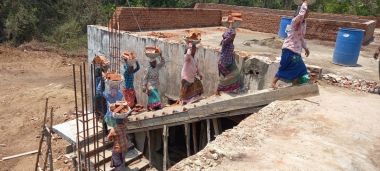Life in the blistering heat

I remember the feeling of dread running up to Tuesday 19 July 2022. Meteorologists had warned for many days that temperatures would exceed 40 degrees. This was the first time this had happened in the UK and the Met Office even issued a red 'extreme heat' warning.
We were deluged with advice on how to stay cool. People kept their curtains closed and prepared meals in advance to avoid cooking. Generally most people planned their lives so there was minimal movement for two days. Anything to keep as cool as possible!
India is in the middle of a heatwave with the mercury soaring to as high as 45 degrees across swathes of the country. The intense heat has continued for days and I am struggling to comprehend just how life can carry on as normal. The majority of people in India live hand to mouth so not working equates to not eating. So they endure the blistering temperatures, putting themselves at risk of heat stroke.
When we asked our hospital leaders in India for their prayer needs last week, each mentioned the heat. This is telling as these leaders have many pressures on their time and resources. Yet they were so concerned for the comfort of leprosy patients. Many have restricted movement and are struggling in wards with no air conditioning. Their limbs are often bandaged to keep deep wounds clean. Staff stoically do all they can for the patients, working 12-hour shifts, six days a week.
Meanwhile people queue outside in the blistering heat at our outpatients' departments. Leprosy Mission hospitals are usually the only place they can see a doctor free of charge. Crucially they are often the only places where leprosy patients are loved, accepted and cared for. So, although terribly uncomfortable, a wait under the burning midday sun is a means to an end.
Thanks to our amazing supporters, building work is being carried out at many of our hospitals. This is necessary to provide essential care and future proof leprosy services. I received the photo above from my colleague in Salur in Andhra Pradesh yesterday. It shows women labourers enduring 45-degree temperatures. They are finishing the student accommodation for the first specialist leprosy nursing college. There is a race to do this as the college opens its doors in September. Looking immaculate in their brightly coloured saris, I felt for these women so much. I simply could not comprehend carrying out such physical work in insufferable temperatures.
The World Meteorological Organization warned on Tuesday that Asia is bearing the biggest climate change brunt. The warning from the United Nations agency sadly came as no surprise to us here in our Peterborough office. Over the past few years we have witnessed our colleagues in Asia struggle with severe heatwaves, floods and storms.
In fact we now need to budget for extreme climate emergencies which happen every year. Last year we provided emergency food and medical supplies to communities affected by leprosy in Myanmar. This followed Cyclone Mocha which made landfall in Western Myanmar on 14 May. With wind speeds of up to 250km per hour, it was one of the strongest cyclones to ever hit the country, destroying homes and livelihoods.
The news that Asia's struggle with climate change is greater than the rest of the world's came a day after Earth Day. I don't know about you but I love looking at the photos that NASA release each year in celebration of our incredible planet. Taken from satellites, aircraft and deep-space missions, they leave me in awe and wonder at God's beautiful creation.
How to protect our beautiful planet, and the people suffering the most from climate change, is a monumental challenge. The World Meteorological Office is calling for national weather services across Asia to improve disaster planning. There are renewed calls for governments to implement net zero emissions by 2040 to help quell rising temperatures. In our own lives we are encouraged to reduce our carbon footprints by flying and driving less and switching to renewable energy.
We pray by doing our part we can somehow improve life for the people we serve in the coming years. As for now, we keep our colleagues and patients at all our hospitals across India in our prayers. The summer monsoon will bring relief, but it's still weeks away. Until then, we pray they stay strong and well.
Peter Waddup is Chief Executive of The Leprosy Mission











